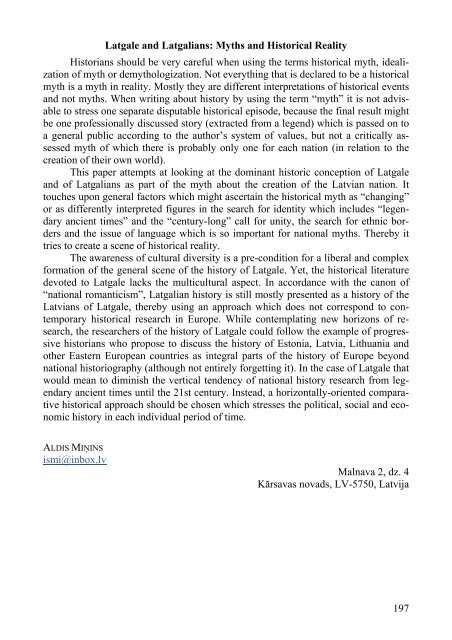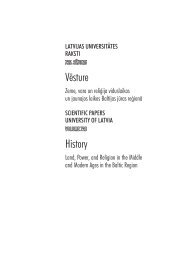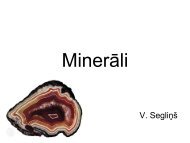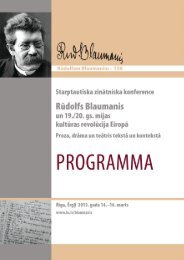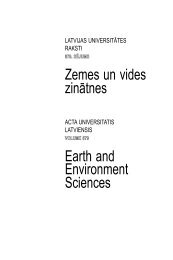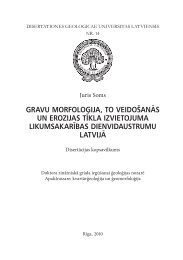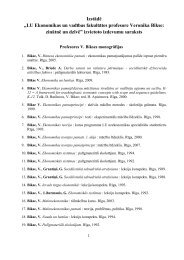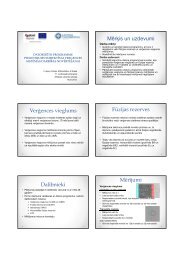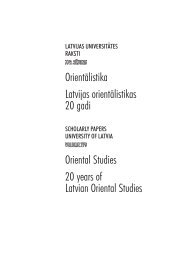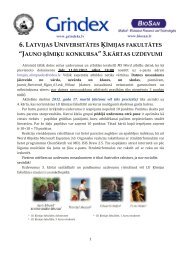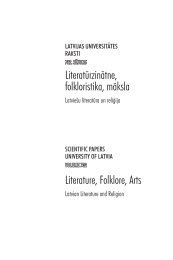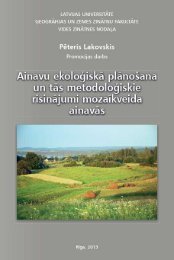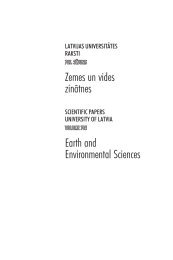Latgalistikys kongresu materiali, III. 2011. - Latvijas Universitāte
Latgalistikys kongresu materiali, III. 2011. - Latvijas Universitāte
Latgalistikys kongresu materiali, III. 2011. - Latvijas Universitāte
Create successful ePaper yourself
Turn your PDF publications into a flip-book with our unique Google optimized e-Paper software.
Latgale and Latgalians: Myths and Historical Reality<br />
Historians should be very careful when using the terms historical myth, idealization<br />
of myth or demythologization. Not everything that is declared to be a historical<br />
myth is a myth in reality. Mostly they are different interpretations of historical events<br />
and not myths. When writing about history by using the term “myth” it is not advisable<br />
to stress one separate disputable historical episode, because the final result might<br />
be one professionally discussed story (extracted from a legend) which is passed on to<br />
a general public according to the author’s system of values, but not a critically assessed<br />
myth of which there is probably only one for each nation (in relation to the<br />
creation of their own world).<br />
This paper attempts at looking at the dominant historic conception of Latgale<br />
and of Latgalians as part of the myth about the creation of the Latvian nation. It<br />
touches upon general factors which might ascertain the historical myth as “changing”<br />
or as differently interpreted figures in the search for identity which includes “legendary<br />
ancient times” and the “century-long” call for unity, the search for ethnic borders<br />
and the issue of language which is so important for national myths. Thereby it<br />
tries to create a scene of historical reality.<br />
The awareness of cultural diversity is a pre-condition for a liberal and complex<br />
formation of the general scene of the history of Latgale. Yet, the historical literature<br />
devoted to Latgale lacks the multicultural aspect. In accordance with the canon of<br />
“national romanticism”, Latgalian history is still mostly presented as a history of the<br />
Latvians of Latgale, thereby using an approach which does not correspond to contemporary<br />
historical research in Europe. While contemplating new horizons of research,<br />
the researchers of the history of Latgale could follow the example of progressive<br />
historians who propose to discuss the history of Estonia, Latvia, Lithuania and<br />
other Eastern European countries as integral parts of the history of Europe beyond<br />
national historiography (although not entirely forgetting it). In the case of Latgale that<br />
would mean to diminish the vertical tendency of national history research from legendary<br />
ancient times until the 21st century. Instead, a horizontally-oriented comparative<br />
historical approach should be chosen which stresses the political, social and economic<br />
history in each individual period of time.<br />
ALDIS MIŅINS<br />
ismi@inbox.lv<br />
Malnava 2, dz. 4<br />
Kārsavas novads, LV-5750, Latvija<br />
197


